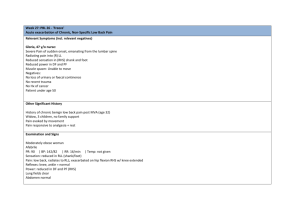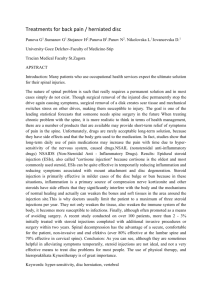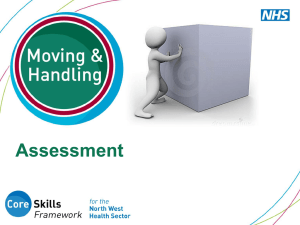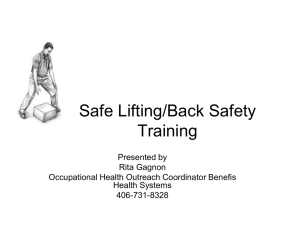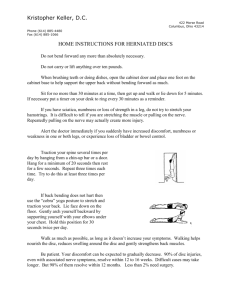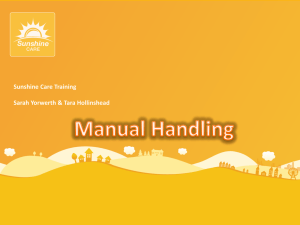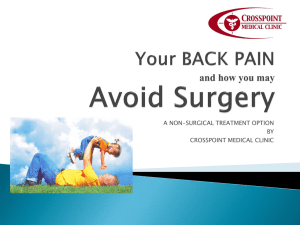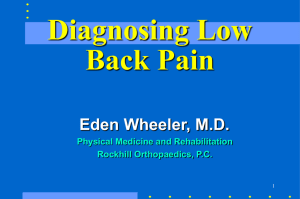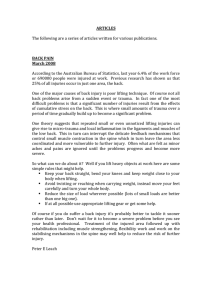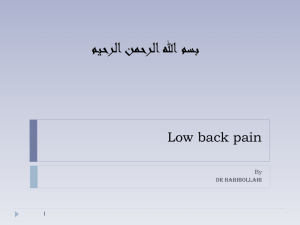Manual Handling Training
advertisement
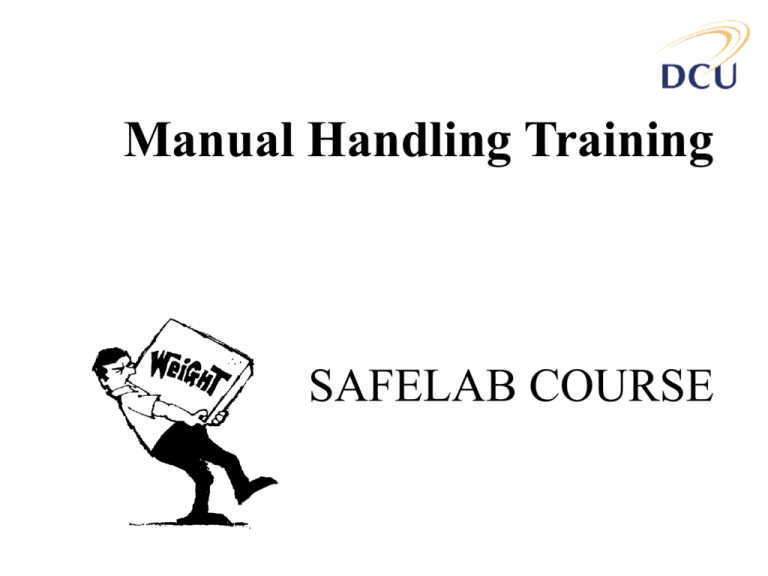
Manual Handling Training SAFELAB COURSE Introduction 1. 2. 3. 4. Legislation Anatomy Ergonomics Principles of lifting Objectives • At the end of this session you will be able to: 1. Basic understanding of your back 2. Understand principles of safe manual handling 3. Know when to stop! Did You Know ? 80% of people in the western world are affected with back pain Manual Handling - Definition Any transporting or supporting of a load by one or more employees and which may include; – LIFTING – PUTTING DOWN – PUSHING – PULLING – CARRYING OR MOVING A LOAD which by reason of it’s characteristics or unfavorable ergonomic conditions involves risk, particularly of back injury to employees 1. LEGISLATION Safety, Health and Welfare at Work Act 1989 Safety, Health and Welfare at Work (General Application 1993) Regs. 2. Anatomy Why Is It important? • The Musculo-skeletal System of the body is designed for movement • In order to lift and handle an object safely it is essential to have a knowledge of this system and its flexibility Spinal Column 7 Cervical 12 Thoracic 5 Lumbar 5 Sacrum (fused) Neck Ribcage Lower back 4 coccyx (fused) Lumbar Spine • 5 vertebrae • Facet joints • Discs Facet Joints • Only in Lumbar Spine • Gliding movement Spinal cord • Down through the centre of the spine we have our spinal cord • This brings messages to the brain from the rest of the body and from the brain to the rest of the body • Nerves from the spinal cord control the movement of the trunk, arms and legs Muscles • The spine is strengthened and made moveable by muscles. • This makes your back flexible as opposed to a fixed bamboo like situation • Posture muscles are not designed for lifting Spinal Ligaments • Ligaments: soft tissue in joint capsule. Limit mobility. • Long Ligaments • Limit movement of spine Types of Back Pain • There are over 100 accepted causes of low – back pain (small of the back) – Wear and tear being the most common • Three types of mechanical back injury which may be caused by poor manual handling practice – DISC INJURY – SOFT TISSUE INJURY – BONY INJURY Disc Degeneration - Gradual • Nutrition cannot get to disc • Disc dries out • Lack of nutrition leads to disc degeneration • EXPERIENCE A HIGH LEVEL OF PAIN DUE TO PRESSURE ON NERVE ENDINGS Disc Pressure • When pressure is applied on the spinal nerves pain can be felt in several areas • Sciatica is caused by disc pressure on the sciatic nerve Pain Distribution Wear and Tear • Wear and tear effects can be noticed from as early as 25 years of age – earlier if there has been an injury • Heavy physical work over a long period causes wear & tear • Remember we should only lift what we are physicaly able to lift at the time of the lift • Muscles are strained by over loading or a sudden stretch or unexpected movement • The more we overdo- the less we can do Ergonomic Assessment – Information required to carry out an ergonomic assessment: • • • • THE TASKS THE LOADS THE WORKING ENVIRONMENT INDIVIDUAL CAPABILITY 5. Principles of Lifting 1. 2. 3. 4. 5. 6. 7. 8. Assess Task, Area, Load Broad Stable Base (Feet Flat on Floor) Bend the Knees Back Straight (Not necessarily vertical) Firm Grip (Palmer) Arms in Line with Trunk Weight Close to Centre of Gravity Point feet in the Direction of Movement Principles of Lifting • Divide the load • Balance the body • Example - Two smaller loads - as opposed to one large one Pushing and Pulling • • • • Keep your back straight Bend at the hips and knees Let your legs do the work Pushing is better than pulling • Pushing is easier as you can see over the load • If you can’t see over the load GET HELP 6. Practical application • • • • • • To and from the floor To and from a bench To and from a height Pushing Pulling 2 persons lift Summary • There is legislation to help and protect you • Being aware of your body and how it works will prepare you • Being flexible and fit will benefit you • Handling loads correctly is the only way Health & Safety Office Thank you for your time & Remember……. ……nobody is immune to natural wear and tear ……use it or lose it!
